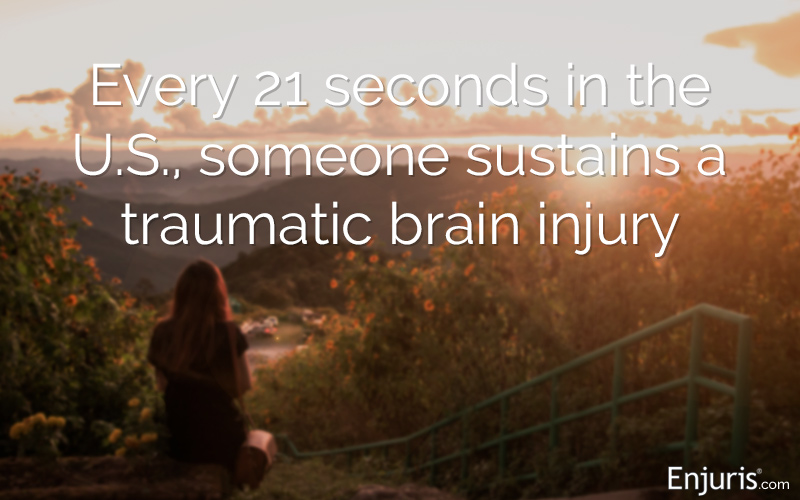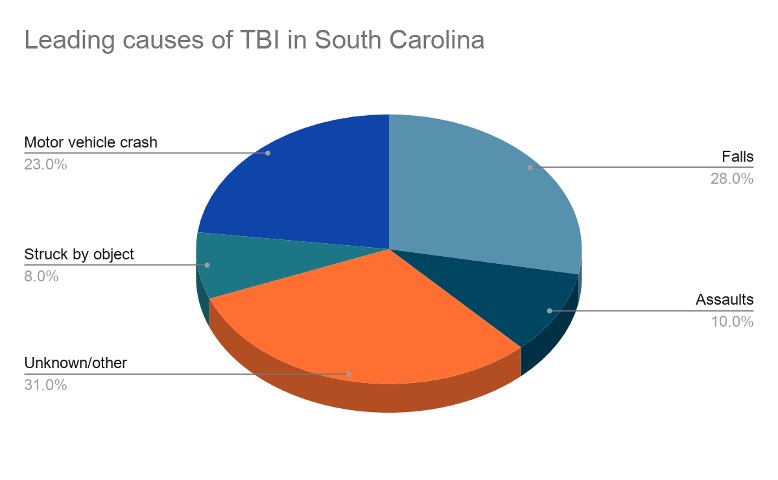
Can you recover damages (compensation) following a catastrophic head or traumatic brain injury?
A “head injury” is a broad term that describes a wide range of injuries that occur to the scalp, skull, brain, and underlying tissue and blood vessels.
According to Harvard Health Publishing, head injuries result in more than 2 million emergency department visits and 72,000 deaths in the United States every year. An additional 80,000 to 210,000 people become disabled or require extended hospital care.
Clearly, head injuries are quite common, and many are the result of negligence.
If you suffered a head injury in South Carolina, you may be able to receive compensation under the state’s personal injury laws. Continue reading to learn more.
Common types of head injuries
Trauma to the head can cause several types of injuries, ranging from minor bumps and bruises to severe brain damage.
The following are some of the most common and serious types of head injuries:
- Skull fracture. A skull fracture is a crack or break in one of the skull’s bones. There are 4 major types of skull fractures: linear skull fractures, depressed skull fractures, diastatic skull fractures, and basilar skull fractures. In most cases, a skull fracture causes a bruise on the surface of the brain under the fracture.
- Concussion. If there are any symptoms of confusion, memory impairment, or loss of consciousness after a head injury, the injury is called a "concussion." Symptoms may last for minutes or hours.
- Traumatic brain injury (TBI). The term “traumatic brain injury” (or “TBI”) is used to describe any injury that causes a disruption in the normal functioning of the brain. A concussion is considered a TBI.
- Intracranial hematomas (ICH). An intracranial hematoma occurs when blood clots develop in or around the brain. There are several types of intracranial hematomas depending on their location in the brain. These can range from mild to life-threatening.

Symptoms of head injuries
Head injury symptoms can be grouped into 2 categories: mild and moderate to severe. It’s a good idea to visit your doctor after any head injury, but it’s imperative that you seek immediate medical attention if you’re experiencing moderate to severe head injury symptoms.
| Common head injury symptoms | |
|---|---|
| Mild head injury | Moderate to severe head injury |
|
|
| Source: Johns Hopkins Medicine | |
Pursuing a personal injury claim for your head or brain trauma
Depending on how you sustained your injury, you may be able to file a legal claim and recover damages under South Carolina’s personal injury laws.
The 3 scenarios in which you’re likely to recover damages for a head injury include:
- Your head injury was the result of someone else’s negligence
- Your head injury was the result of someone else’s intentional act
- Your head injury occurred at work
Let’s take a look at all 3 possibilities:
1. Head injuries caused by someone else’s negligence
If your head injury was caused by someone else’s negligence, you may be able to recover damages. To establish negligence in South Carolina, you need to prove the following elements:
- The defendant owed you a duty of care,
- The defendant breached the duty of care, and
- The defendant’s breach was the cause of your injury.
The specific duty of care owed by the defendant (if any duty is owed at all) depends on the nature of the relationship between the plaintiff and the defendant. In most cases, the duty owed is the duty to exercise “reasonable care” to avoid harming the plaintiff.
Let’s look at an example:
Aliyah was thrown from her motorcycle and suffered a traumatic brain injury. She sued Benjamin for $500,000.
In South Carolina, all drivers have a duty to exercise reasonable care to avoid harming others on the road. Benjamin likely breached this duty when he failed to stop at the stop sign. Benjamin’s breach of duty (i.e., his failure to stop at the stop sign) was the cause of Aliyah’s injuries. As a result, a court would likely rule that Benjamin was negligent and award Aliyah damages.
2. Head injuries caused by someone’s intentional act
Intentional torts arise when someone harms another person on purpose. The most common intentional tort that may result in a head injury is battery or assault. Just like negligence, you can file a personal injury lawsuit against a defendant to recover damages for an intentional tort.
Immediately after the incident, the child’s parents noticed that the child had bruises on her face and was struggling to hold her head up.
The regional director of the preschool where the incident took place told the child’s parents that the child had been struck in the back of the head by an employee and that employee was suspended due to the incident.
The parents of the child filed a lawsuit against the preschool and an intentional tort claim against the former daycare worker.
The lawsuit, which is currently pending, alleges that the child suffered severe head injuries.
3. Head injuries that happen at work
Workers’ compensation is a state-run insurance program that provides financial benefits to employees who are injured on the job. In South Carolina, most employers with 4 or more employees are required to carry workers’ compensation insurance.
Common causes of work-related head injuries include:
- Falls on slippery, crowded, or unstable surfaces
- Fall from unsafely positioned ladders
- Being hit by a moving object
- Bumping against a fixed object
- Motor vehicle crashes
Workers’ compensation covers head injuries so long as the injury wasn’t self-inflicted and it occurred when the employee was performing a work-related task.
Types of damages in South Carolina head injury cases
In South Carolina personal injury cases arising from head and brain trauma, plaintiffs can typically recover 3 types of damages:
- Economic damages include the monetary losses caused by the accident (medical expenses, lost wages, property damage)
- Non-economic damages include the non-monetary losses caused by the accident (pain and suffering, emotional distress, loss of consortium)
- Punitive damages are meant to punish the defendant and are only available in cases where the defendant acted willfully or recklessly
Head injury resources
Head injuries can be life-altering. The Centers for Disease Control and Prevention (CDC) estimates that at least 5.3 million Americans currently need long-term or lifelong help performing daily living activities as a result of a head injury.
“People, especially teens, don’t realize how life-changing a TBI can be,” said Lynn Brouwers, director of neurosciences for Spectrum Health World Services. “It can be heart-wrenching for people to watch a son, daughter, sibling, or friend have to learn to talk and walk all over again. It’s also tragic when one of these injured young people realize that they will never again be the person they were, and that they will have to greatly alter their hopes and dreams of the future.”
In South Carolina, there are a number of resources that can help you or a loved one on the road to recovery after a catastrophic head injury:
- Brain Injury Association of South Carolina
- South Carolina Department of Disabilities and Special Needs
- Centre for Neuro Skills
- National Institute of Neurological Disorders and Strokes
- Traumatic Brain Injury National Data Center
- Disability Rights South Carolina
Do you have questions about your potential head injury claim? Use our free online directory to contact an experienced personal injury attorney in your area.
See our guide Choosing a personal injury attorney.

